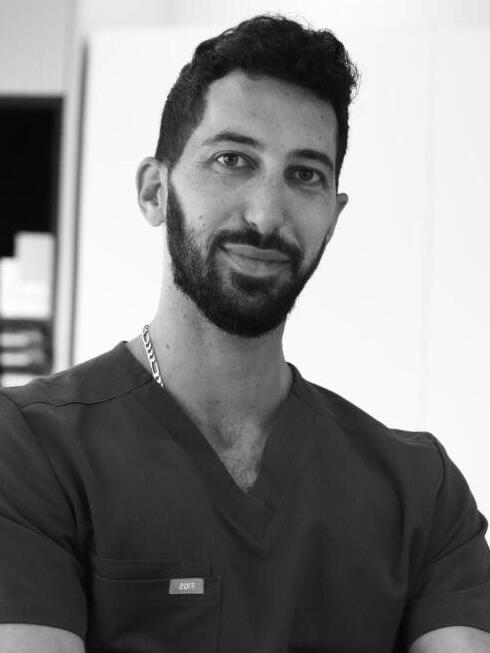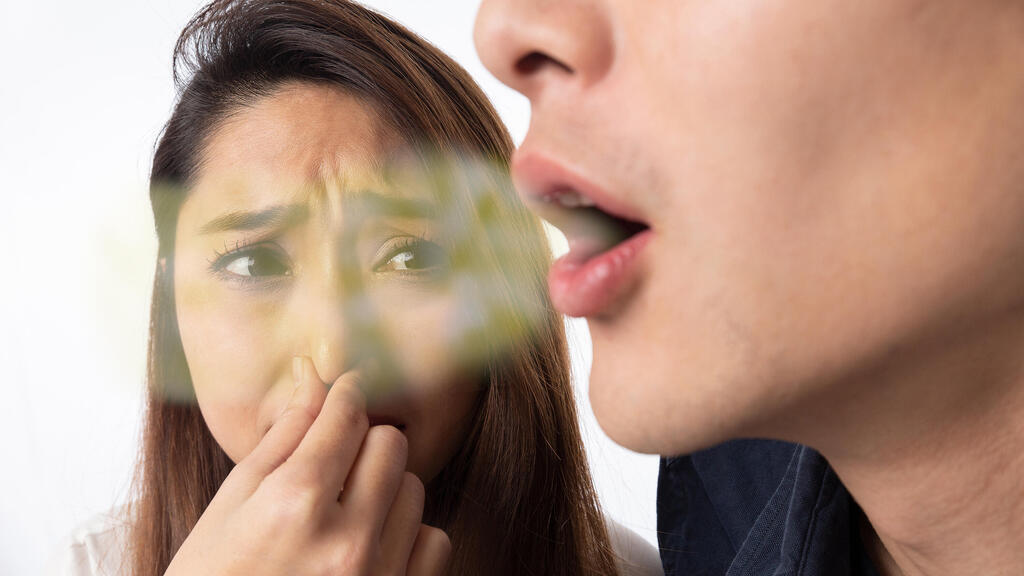Getting your Trinity Audio player ready...
It could be the colleague sitting next to you, a family member, your partner or even you – many of us have encountered bad breath, or halitosis, at some point. And let’s be honest (with one hand over your heart and the other near your mouth), have you ever wondered if you’re the one with the problem?
What causes bad breath?
“Halitosis, the medical term for bad breath, is primarily caused by sulfuric byproducts released when oral bacteria break down leftover food particles,” explains Dr. Dan Zeituni, a dentist with MaccabiDent, part of Maccabi Healthcare Services.
2 View gallery


Bad breath is the third most common reason people visit their dentist
(Photo: Shutterstock)
These volatile sulfur compounds (VSCs), including hydrogen sulfide, methyl mercaptan, and dimethyl sulfide, are major culprits. The specific mix of bacteria in your mouth directly influences how much VSC is produced. “This is why some people struggle with chronic bad breath, while others don’t,” says Zeituni.
Certain dental issues can worsen the problem, such as dentures, braces, inflamed gums, broken fillings, or loose crowns. In fact, in the U.S., bad breath is the third most common reason people visit their dentist, following cavities and gum disease. The good news? It’s treatable in most cases.
How to address bad breath
Treatment depends on the source. Sometimes, it’s as simple as maintaining good oral hygiene – brushing, flossing and regular dental cleanings. In more severe cases, like chronic tonsillitis, tonsil removal may be necessary.
Is bad breath common?
“Not as much as people think. Often, it’s more about perception than reality,” notes Zeituni.
If you’re checking by blowing into your hand, don’t rely too much on this method. “It’s only partially effective and can be misleading, especially if you’ve just eaten or brushed your teeth.”
A more reliable option is visiting your dentist for an OralChroma test. This device measures VSC levels and identifies whether the odor originates from your tongue, gums or elsewhere. Just make sure to avoid eating, drinking, smoking or brushing your teeth for at least an hour before the test.
Everyday tips to prevent bad breath
Dr. Zeituni recommends:
Drink water: Staying hydrated helps wash away food particles and bacteria.
Brush and floss: Don’t forget to clean your tongue with a toothbrush or a special scraper.
 Dr. Dan ZeituniPhoto: Orit Pnini
Dr. Dan ZeituniPhoto: Orit PniniMouthwash: While not a cure-all, alcohol-free mouthwash can support oral hygiene.
Smoking and bad breath: Aside from the lingering smell of tobacco, smoking can alter your mouth’s bacterial balance. Chewing gum won’t fix this – quitting is the best option.
Is it all in your head?
Dr. Alex Rosenthal, a gastroenterologist with Maccabi Healthcare, points out that only babies truly have no bad breath. “Morning breath is normal, as saliva production slows while you sleep. But if bad breath persists, your dentist might need to take a deeper look, sometimes even using a panoramic X-ray.”
If dental issues aren’t the cause, other potential culprits include:
Sinus issues: Chronic congestion, polyps or infections.
Dry mouth: From salivary gland issues or medications.
Digestive problems: Conditions like reflux or ulcers caused by helicobacter pylori.
Dr. Rosenthal notes that halitophobia – the irrational fear of bad breath – is a surprisingly common psychological condition, particularly among women. “Some people are convinced they have bad breath even when they don’t. I tell patients it’s like trying to see your own ears without a mirror.”
DIY breath check
Close your mouth for a minute, then exhale slowly and ask a trusted person to assess the smell. Remember, most people wake up with morning breath, but it should fade after breakfast and brushing.
 Dr. Alex RosenthalPhoto: Maccabi Healthcare Services
Dr. Alex RosenthalPhoto: Maccabi Healthcare ServicesDietary fixes for bad breath
Certain foods, like onions, garlic and cauliflower, can cause temporary bad breath. Spicy foods like curry and chili peppers can also leave odors. Dieticians Chen Nina Lessri and Tamar Kornaf explain that the compounds in these foods are absorbed into the bloodstream and released through breath and sweat. Beverages like coffee and alcohol, which promote bacterial growth, are also common offenders.
Natural remedies for bad breath
Herbalist Haim Hazan suggests:
Mastic resin: This natural resin can combat H. pylori. Place a thin layer on your upper palate or swallow a small amount to target stomach bacteria.
Frankincense and myrrh: Dissolve a small amount in water or chew like gum to release their antibacterial properties.
Get the Ynetnews app on your smartphone: Google Play: https://bit.ly/4eJ37pE | Apple App Store: https://bit.ly/3ZL7iNv
Essential oil rinse: Mix four drops each of tea tree, lavender, and peppermint oils with 100 mL of water. Shake before use and rinse as needed.
While bad breath can be an awkward topic, it’s manageable with the right care and solutions. Don’t let it hold you back—fresh breath is just a few steps away!


